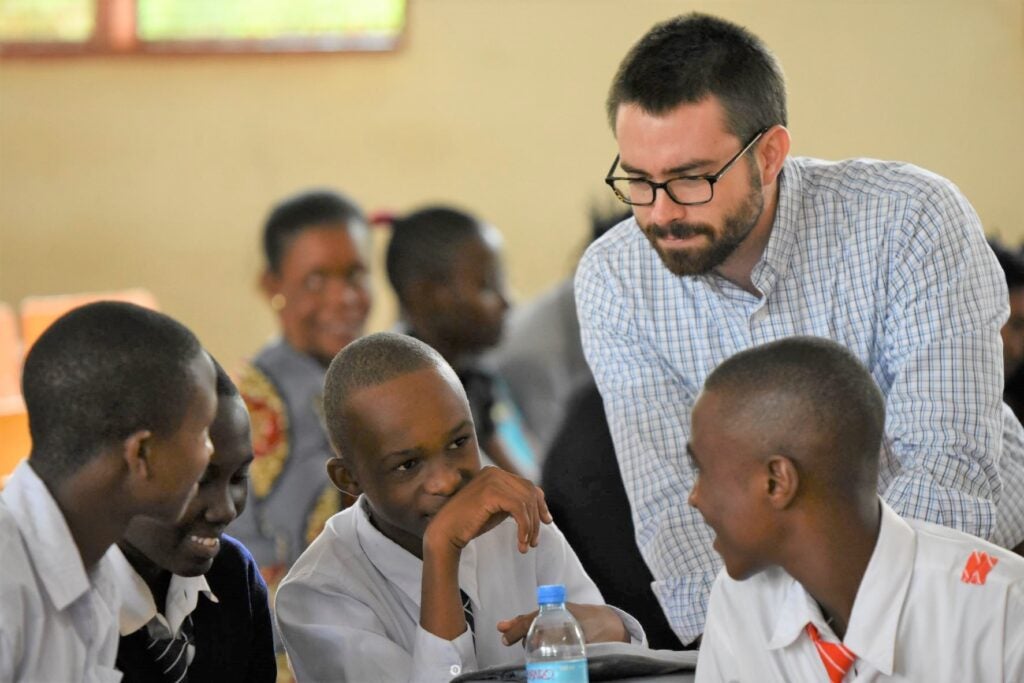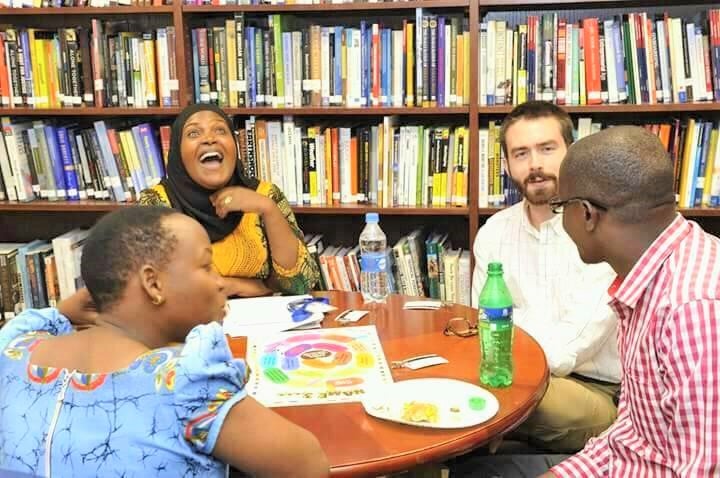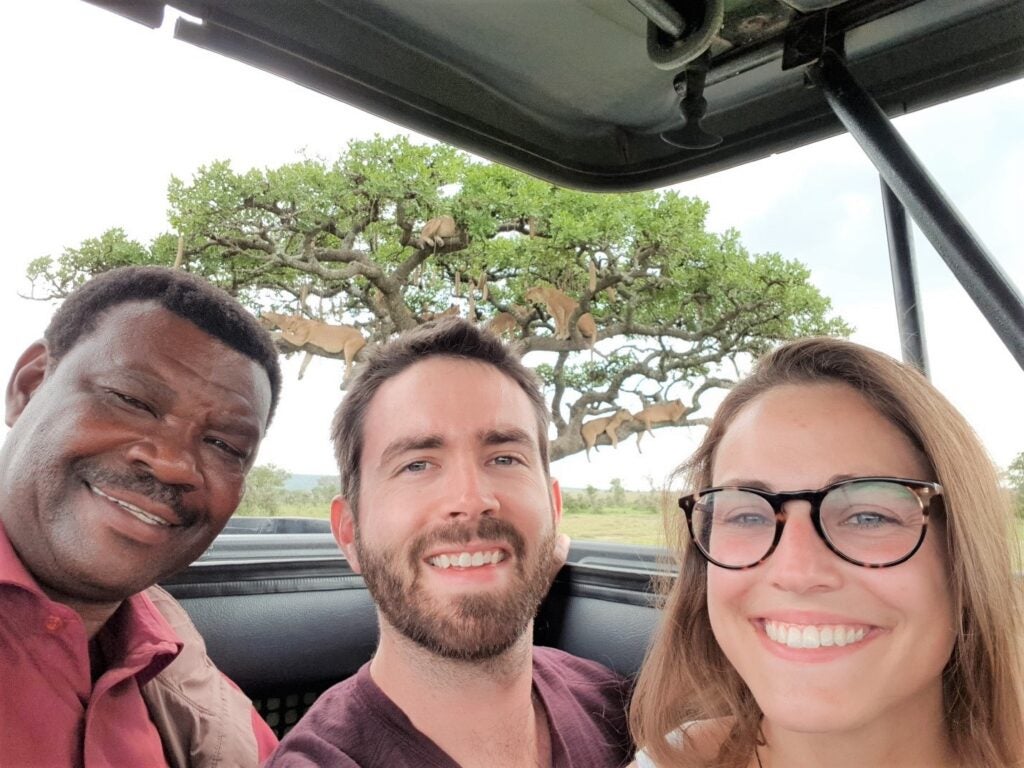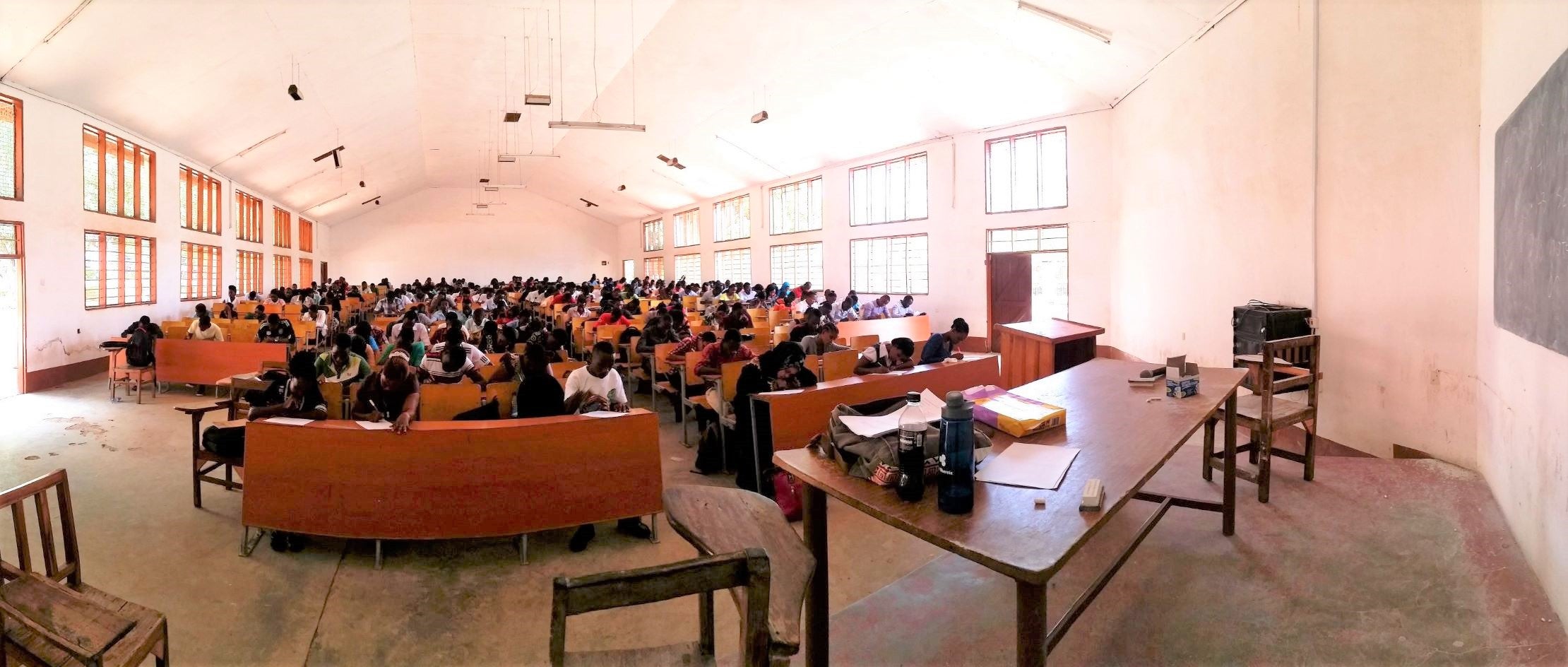When John Whalen signed on as an English Language Fellow in Tanzania, 2016-2018, he was ready to stretch himself both personally and professionally. As it happened, his opportunities for self-expansion were nearly limitless. At his host institution, St. Augustine University of Tanzania, his primary duties were reviewing and developing course outlines, facilitating pedagogical workshops, and teaching courses in English for Engineering, English for Tourism, and Methods of English Language Teaching.
Whalen’s secondary duties involved supporting the university English club and the local chapter of the Tanzanian English Language Teaching Association (TELTA); assisting the Regional English Language Office in nominating, vetting, and interviewing candidates for exchange programs such as the Pan-African Youth Leadership Program (PAYLP), the International Leaders in Education Program (ILEP), and Fulbright Teaching Excellence and Achievement (TEA); and working with English Access Microscholarship Program classes throughout the country. He also had the opportunity to present at conferences in Ethiopia, Uganda, Rwanda, Senegal, and throughout mainland Tanzania and Zanzibar. “Experiences beyond my comfort zone have always brought me moments of clarity,” Whalen says. “And in this case, spending so much time in an unfamiliar but welcoming environment helped me to refocus how I understand myself as a person both inside and outside of the classroom.”
Bringing It All Home with Access Classes
Of Whalen’s many secondary projects, one of his favorites was his collaboration with the Access classes. After Whalen facilitated a workshop on project-based learning, one of the teachers suggested they shape the upcoming Access summer camp around a ‘self-sufficiency’ project, combining topics such as financial literacy, healthy eating, and gender equity into a personal and formative experience for the students. The group loved the idea and the plan for the camp was set. The students engaged in a week of ‘real life’ activities: cooking and cleaning, reflecting on chores, and planning life goals together. For their culminating project, they put on a play for their parents, demonstrating why they thought involving girls and boys equally in both home chores and in household decision-making is crucial for developing useful life skills. “The project’s planning and execution by the Access teachers and their students astounded me,” Whalen reflects, “and I still think of it as the best instance of taking broad pedagogical concepts and ‘bringing them home’ that I’ve ever personally observed.”

A New Perspective Forged Through Challenges
A fellowship so chock-full of new opportunities inevitably comes with its share of challenges, too. Like many eager Fellows before him, Whalen initially took on every project that came his way, spreading himself thin. Soon realizing that this approach was unsustainable, he shifted to dedicating more energy to fewer projects, focusing especially on initiatives that were already being undertaken as passion projects by local experts. Whalen explains, “By focusing less on actualizing my own preconceptions of what should be done and more on empowering local experts, most often through targeted, practical trainings and through connecting project leaders to existing resources, I was able to grow my usefulness over time while also simplifying my outlook.”

Whalen also faced having huge classes of 350 students without a quality microphone or projector. At first, he spent a lot of energy racking his brain, trying to overcome the challenges head-on. But over time, he learned that rather than fighting these obstacles on his own, it would be most useful to accept them, discuss them, and experiment as a group with different ways of boosting student motivation and engagement in a large, low-resource environment. After all, the teachers-in-training he was instructing would themselves one day be working in similar conditions. Whalen states, “Once I stopped thinking about the challenges as ‘bad things that were happening to me’ and instead as realities that my colleagues, students, and I were all contending with together as members of the same team, my stress level went way down and the effectiveness of my work went way up.”
Immersed in Incomparable Geography
Outside of the classroom, Whalen relished the wealth of regional splendors in his fellowship location. Going on Safari in the spectacular Serengeti, swimming and snorkeling in the paradisiacal beaches of Zanzibar, day-hiking Mount Kilimanjaro, and meeting teachers at restaurants on Lake Victoria for dinner after work – all of these activities were readily accessible. Whalen also became warmly attached to his new rural home and its surrounding flora and fauna. “I complained about the noisy family of monkeys that would wake me up by jumping on my roof some early mornings,” he says, “but of course I missed them any morning that they didn’t show up.”

Exploring the Serengeti with friends on Christmas break 
Sharing new books on a local school visit
I think that a lot can be learned about a place by the way people react to an outsider struggling with the local language,” Whalen reflects. “And the baker’s kind feedback was one of my early indications that Tanzania would be one of the warmest, kindest, and more supportive places I have ever visited.
Speaking Swahili with Supportive Locals
The relationships Whalen formed in Tanzania continue to have a significant impact on his life and work. Shortly after wrapping up his fellowship, he collaborated with several close Tanzanian friends to found a small NGO, Keshofund.org, which connects community leaders in Tanzania to resources abroad, helping facilitate education-related development projects. Whalen also values the daily interactions with locals in Tanzania. Though he was a beginner in Swahili, he found that his attempts to communicate in the language were met with appreciative encouragement. He fondly recalled the morning a street baker brightened at hearing his broken Swahili. When he asked for fresh chapati and a mango-avocado smoothie, she responded enthusiastically, telling him that he was doing a great job and to keep working hard, offering him some additional phrases to use next time. “I think that a lot can be learned about a place by the way people react to an outsider struggling with the local language,” Whalen reflects. “And the baker’s kind feedback was one of my early indications that Tanzania would be one of the warmest, kindest, and more supportive places I have ever visited.”

John Whalen was an English Language Fellow in Tanzania, 2016-2018. He has taught at universities in the U.S., China, and Japan, and he volunteers as the U.S. Director for The Kesho Fund. His favorite areas for teacher training include project-based learning, learner-centered instruction, use of available technologies, and comics for language teaching. Currently, Whalen is teaching at Surrey International Institute at Dongbei University of Finance and Economics in Dalian, China, where he also serves as the staff’s Module Convenor for the speaking classes. Whalen aims to someday settle down at a university in New England, where he’s from, and continue to support projects abroad between school years.

